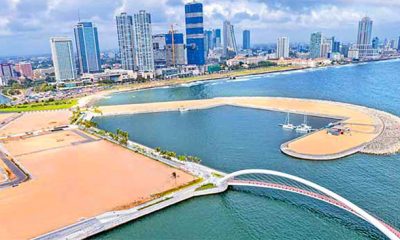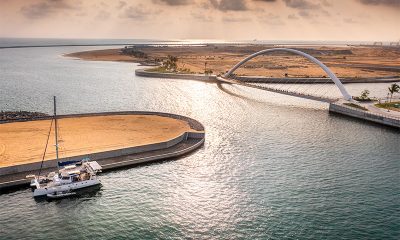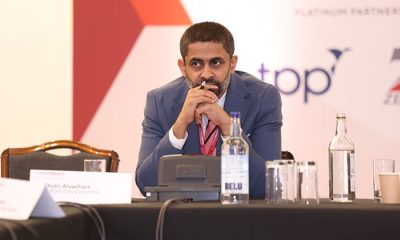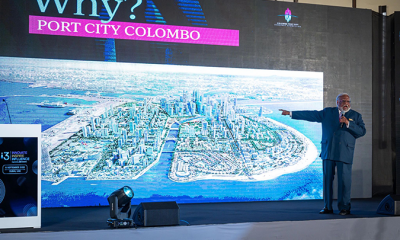Business
Technical Certificates of Completion for 64 out of 74 plots of Port City Colombo SEZ
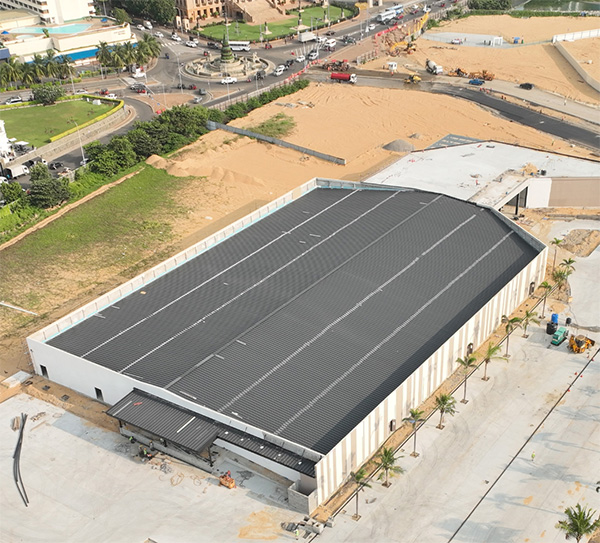
Technical Certificates of Completion for 64 out of 74 plots of the Port City Colombo SEZ have been received by the Commission, a Colombo Port City Economic Commission semi-annual progress report for FY 2022 notes.
A press release by the Commssion said: ‘The Colombo Port City Economic Commission (the Commission), the Single Window Investment Facilitator authorised to assist investors, businesses, and residents in conducting their activities seamlessly and efficiently in Port City Colombo, is pleased to release its semi-annual progress report for FY 2022 from July to December 2022.
‘The Port City Colombo Special Economic Zone (SEZ) is designed to be a prestigious, strategically located city in the heart of South Asia, with sustainable high-quality public spaces and infrastructure, providing top-quality commercial, entertainment, medical, education and lifestyle. International destinations such as DIFC, DMCC, Labuan, Singapore, and Mauritius were studied for their regulatory frameworks, fiscal incentives, and operational efficiency to identify the most competitive processes and policies for Port City Colombo. The benchmarking study was done by global consultants such as Boston Consulting Group, PwC, KPMG, EY, Pinsent Masons, Zico Law, JLL, etc., for the SEZ’s thrust sectors, supported by market feedback on both fiscal and non-fiscal parameters.
‘Port City Colombo SEZ Regulations for the registration, licensing, authorisation and other approvals of Authorised Persons, were published by extraordinary gazette in September 2022, bearing number 2299/46. The SEZ’s Regulations for the registration and licensing of Authorised Person Fees, were also gazetted in September 2022, bearing number 2299/47. The registration of offshore company regulations were gazetted in the month of November 2022, bearing number 2306/54.
‘Agreements have been signed between the Commission and the Registrar General of Companies and Controller General of Immigration and Emigration in order to streamline services offered to Authorised Persons.
‘Sectoral Progress Highlights:
Banking – The Minister of Finance issued licences under the Colombo Port City Economic Commission Act to four (4) banks during the first half of 2022. The Commission has since received requests from three (3) more banks during 2022. Additionally, 10 Financial and Banking Regulations were also drafted under Sections 44 and Sections 45 of the Colombo Port City Economic Commission Act No. 11 of 2021 and are awaiting review with the Monetary Board of Sri Lanka.
Security – The Sri Lanka Police opened a Post on-site for visitor protection, with water access control and lifeguard services being handed to the Sri Lanka Navy. CCTV networks were also installed in public areas.
Social Infrastructure – In addition to an internationally-reputed hospital and school, the Commission has identified the need for a world-class university within Port City Colombo and modified the Master Plan accordingly.
Commercial Infrastructure – With the retail mall infrastructure complete, the commencement of the interior work has begun. The mall will showcase premium merchandise, with an array of cuisine options and entertainment, and is set to commence operations by Q2 of 2023.
Immigration and Visa Arrangements – In collaboration with the Department of Immigration and Emigration, the Commission has introduced three (3) new visa categories for Port City Colombo. These 3 visa categories are – the Investor visa for ten (10) years, the Employment visa for up to five (5) years, and the Resident visa for five (5) years. Port City Colombo visas allow supplementary benefits, such as visas for the spouse, kids, and other support staff members, which can be obtained under the primary visa applicant. The visa fee is USD 200 per year for each applicant. Visas are renewable as required and applicable only to Foreign Investors.
Master Plan Implementation – A planning committee consisting of key stakeholders was created to expedite the approval of building plans submitted under the Development Control Regulations (DCRs) for each plot of the Port City Colombo SEZ. The DCRs provide a clear framework for the development of buildings, land use, green spaces, utility networks, and sustainability measures, among other factors.
Preliminary designs for the Marina Development and Villa Project have been submitted by two investors, with several more plots in the final stages of discussion for lease.
Business
President AKD writes to President Trump over trade deficit concerns
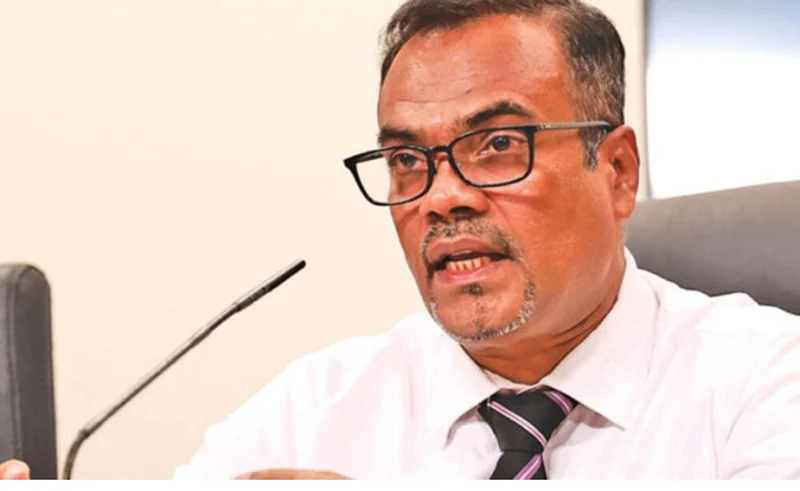
In a bid to address mounting trade tensions, the Sri Lankan government has intensified efforts to reduce its significant trade deficit with the United States, Deputy Minister of Economic Development Dr. Anil Jayantha Fernando announced in parliament yesterday. He added that President Anura Kumara Dissanayake has despatched a formal letter to President Trump urging, among other things, a re-assessment of the recent enhanced tariff regime imposed on Sri Lanka.
The move follows reciprocal tariffs imposed by U.S. President Donald Trump, which Sri Lankan authorities say significantly affect key export sectors. The Deputy Minister indicated that the White House has acknowledged receipt of the Lankan President’s letter, signaling the launching of a potential bilateral dialogue.
Responding to a question raised by New Democratic Front (NDF) MP Ravi Karunanayake, Deputy Minister Fernando revealed that 88% of Sri Lanka’s trade deficit over the past five years stemmed from U.S. trade relations with apparel, rubber products, spices, other agricultural products and precious gems constituting 85% of total exports to the U.S. These exports, he noted, already face tariffs and paratariffs, but President Trump’s recent levies were calculated based on bilateral trade imbalances – a factor that has placed Sri Lanka’s economy under heightened pressure.
“The President’s intervention underscores our commitment to protecting Sri Lankan industries and fostering equitable trade terms, Fernando stated, defending the administration’s proactive and reactive measures to mitigate the US tariffs’ impact on local businesses.
Highlighting ongoing engagement, he added that another round of high-level discussions with the Office of the U.S. Trade Representative (USTR) was scheduled overnight. These talks aim to address structural trade imbalances and explore avenues for tariff relief, particularly for Sri Lanka’s apparel sector, which employs millions nationwide.
The President’s letter marks a strategic move in Sri Lanka’s diplomatic outreach, reflecting the government’s urgency to stabilise an economy still recovering from recent crises while in the middle of an IMF programme.
Sri Lankan industry leaders have cautiously welcomed the government’s efforts but emphasise the need for swift, tangible outcomes.
At present, all eyes remain on Washington’s response to President Dissanayake’s appeal – a potential turning point for Sri Lanka’s trade future, observers noted.
By Sanath Nanayakkare
Business
Inclusive and sustainable apparel for SDGs
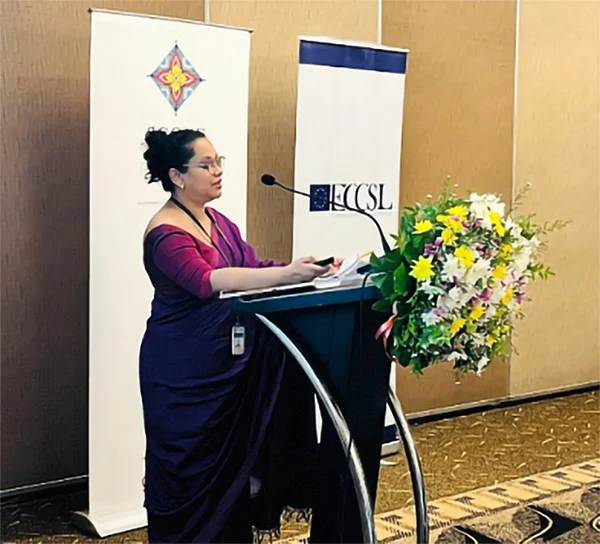
The European Chamber of Commerce of Sri Lanka (ECCSL), in collaboration with the Strengthening Social Cohesion and Peace in Sri Lanka (SCOPE) programme, recently hosted its third industry-focused event, bringing together apparel-sector stakeholders to exchange experiences and practical insights on embedding inclusivity and sustainability into business operations.
Building on the success of ECCSL’s earlier events focused on tourism and food and agriculture, this apparel-focused gathering convened government representatives, industry leaders, business practitioners and the academia to discuss practical strategies for embedding inclusivity and sustainability into business operations.
While many businesses already recognize the importance of these principles, the event emphasized practical implementation, shifting the conversation from the “why” to the “how” of inclusive and sustainable practices.
Chamindry Saparamadu, Director General of the Sustainable Development Council of Sri Lanka, discussed how the Government of Sri Lanka is supporting businesses to create social and environmental impact through its Inclusive and Sustainable Business (ISB) Strategy. Ms. Saparamadu outlined how this strategy aims to create a resilient, equitable, and sustainable economy by building an ecosystem in which inclusive and sustainable businesses can thrive, driving transformative change across industries.
The event also featured engaging presentations from leading apparel businesses—Omega Line, Hirdaramani, and Compreli Consulting—each showcasing real-world examples of how inclusivity and sustainability can be embedded into business operations.
Omega Line, represented by Saman Jayasinghe (Chief HR Officer, Group – Administration) and Charman Dep (Assistant General Manager – Production Planning), presented its multifaceted sustainability approach, spotlighting its Vavuniya factory as a successful model for combining environmental stewardship with social impact.
Hirdaramani’s Manindri Bandaranayake (Chief Brand & Sustainability Officer for Sri Lanka, Bangladesh, Ethiopia, and Vietnam) showcased the company’s holistic sustainability framework, including its Wonders of Wellbeing (WOW) program, policies supporting differently-abled individuals, and deep community engagement.
Finally, Compreli Consulting co-founders Ramesh De Silva and Shehan Olegasageram showcased their innovative garment repair-as-a-service model—a circular, scalable solution that reduces waste and carbon emissions, while aligning with evolving global sustainability regulations.
Participants then had the opportunity to share their own knowledge in a group discussion, exchanging experiences and reflecting on the challenges and opportunities encountered in their sustainability journeys.
The event underscored the collective benefit of building Sri Lanka’s reputation as a global leader in inclusive and sustainable business. By fostering collaboration between businesses, the academic community and government stakeholders, the session aimed to accelerate broader industry adoption of these principles and contribute to Sri Lanka’s sustainable economic growth.
The discussions were facilitated by the Project Lead of ECCSL’s Inclusive Business Practices project, William Baxter.
Business
Union Assurance records Rs. 5.2 Billion PBT, fortifying its financial position by delivering best-in-class value

Union Assurance PLC, Sri Lanka’s longest-standing private Life Insurer, has recorded a strong financial performance with growth across key metrics for the year ending December 31, 2024. The Company achieved a 15% growth in gross written premium, totalling Rs. 21.6 billion driven by double-digit growth in both regular new business premiums and renewal premiums and paid Rs. 7.7 billion worth of claims and benefits to its customers during the year. In addition, for the year ending December 2024, the Company also declared an industry-leading universal life policyholder dividend rate of 12%, underscoring its continued commitment to deliver exceptional value to its customers.
Net investment income recorded a 9% year-on-year growth to reach Rs. 11.8 billion aided by an effective asset allocation strategy. The gains from the trading investment portfolio increased by 123% to reach Rs. 2.9 billion driven by the strong performance of the Colombo Stock Exchange during the latter part of the year.
Union Assurance distributed Rs. 3 billion as surplus from the policyholder fund and reported a profit after tax of Rs. 3.7 billion for 2024. The Company declared a final shareholder dividend of Rs. 5.00 per share amounting to a total payout of Rs. 2.9 billion.
A key milestone for Union Assurance in 2024 was the surpassing of Rs. 100 billion in total assets for the first time in its history, ending the year with Rs. 109.5 billion. This underscores the Company’s solid financial foundation and growth trajectory.
The Company’s assets under management grew by 15% during the year, reaching Rs. 95.6 billion driven by market valuation gains and cash generation from business operations. Furthermore, Union Assurance’s capital adequacy ratio stood at a healthy 264% at the end of 2024, well above the regulatory minimum of 120%.
-

 Business3 days ago
Business3 days agoColombo Coffee wins coveted management awards
-

 Business5 days ago
Business5 days agoDaraz Sri Lanka ushers in the New Year with 4.4 Avurudu Wasi Pro Max – Sri Lanka’s biggest online Avurudu sale
-

 Features4 days ago
Features4 days agoStarlink in the Global South
-

 Business6 days ago
Business6 days agoStrengthening SDG integration into provincial planning and development process
-

 Business5 days ago
Business5 days agoNew SL Sovereign Bonds win foreign investor confidence
-

 Sports7 days ago
Sports7 days agoTo play or not to play is Richmond’s decision
-

 Features4 days ago
Features4 days agoModi’s Sri Lanka Sojourn
-

 Midweek Review16 hours ago
Midweek Review16 hours agoInequality is killing the Middle Class


